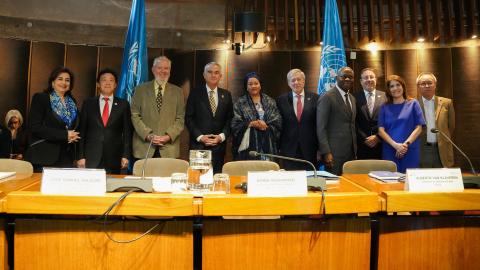News
The Executive Secretary of the Economic Commission for Latin America and the Caribbean (ECLAC), Alicia Bárcena, moderated a high-level roundtable today in New York that was convened by the government of Chile to discuss multidimensional poverty and inequality in middle income countries, in the framework of the 72nd session of the United Nations General Assembly.
Chilean President Michelle Bachelet inaugurated the event, entitled “High-level Roundtable on Multidimensional Poverty and Inequality in middle income countries and the achievement of the Sustainable Development Goals.” Participants included the President of Honduras, Juan Orlando Hernández; the Prime Minister of Curaçao, Eugene Rhuggenaath; the Vice President of Costa Rica, Ana Helena Chacón; and other senior authorities from Colombia, Mexico, the Philippines and Spain as well as the Administrator of the UN Development Program (UNDP), Achim Steiner, and the UN Under-Secretary-General for Economic and Social Affairs (UN-DESA), Liu Zhenmin.
In her introduction to the debate, ECLAC’s most senior representative indicated that “the eradication of poverty, which is the first of the Sustainable Development Goals (SDGs), is a demand and a moral imperative for our societies, especially at this time in history when the world has enough resources to satisfy the basic needs of all and to achieve adequate living standards.”
Alicia Bárcena said that poverty measurement to date has mainly been concentrated on monetary aspects, but the lack of income to satisfy basic needs is not the only reflection of this scourge. Therefore, she said, other types of measurements are needed as well that take into account the rest of the deficiencies that people suffer.
“When we measure poverty by income, we should do so to measure access to acquiring private goods and services. That explains the importance of having a basic minimum income for citizens,” Bárcena emphasized.
She added that “the indicators of multidimensional poverty, which seeks to encompass a broad range of human deprivations, are important for guiding public policies – not just social ones but also economic and environmental policies that have an impact on the population’s living conditions.”
However, she acknowledged that multidimensional poverty measurement poses several challenges and questions that must still be elucidated. She highlighted the work already carried out by countries such as Chile, Colombia, Costa Rica, Honduras and Mexico, which were the first Latin American nations to adopt multidimensional measures of poverty and to design specific policies for addressing this problem.
She also stressed the importance of the work of regional commissions like ECLAC which, along with other United Nations institutions and departments such as the UNDP and UN-DESA, have played a key role in supporting these new multidimensional measurements and thereby promoting the process of achieving the SDGs in the region’s countries. She added that the UN system should work in a more integrated way to support those countries considered to be “middle income” so they can obtain data and formulate poverty policies with a multidimensional perspective.
In her remarks, Alicia Bárcena underscored ECLAC’s work over the years to research the links between the multidimensional measurement of poverty and public policy design, making special mention of the “unmet basic needs approach” introduced by this United Nations regional commission in the early 1980s. More recently, the institution’s work on multidimensional poverty has emphasized the need to develop comparable measurements among the countries of Latin America and the Caribbean and to overcome shortfalls in existing information on relevant aspects of poverty.
She further recalled that the precise issue of multidimensional poverty will be analyzed at the second meeting of the Regional Conference on Social Development in Latin America and the Caribbean (a subsidiary body of ECLAC), which will be held in collaboration with the UNDP on October 25-27, 2017 in Montevideo, Uruguay.
At the event in New York, Chilean President Michelle Bachelet spoke of the actions that her country has taken to update the measurement of poverty by income and introduce multidimensional parameters. She explained that deficiencies in the areas of housing and the environment were included to better understand the population’s social and economic gaps.
“We understand that economic growth is not a goal in itself; it is just a precondition for achieving a better quality of life,” the Chilean leader stated.
Meanwhile, the President of Honduras, Juan Orlando Hernández, referred to the problem of drugs, which he described as “life or death.” He indicated that the link between violence and poverty is key. “It is impossible to talk about poverty without seeing that people don’t have a toilet or how they eat,” he said.
Costa Rica’s Vice President, Ana Helena Chacón, referred to the Multidimensional Poverty Index (MPI) that her country is implementing, which will allow it to compare progress on eradication at an international level. “The reality of poverty must be understood well beyond economic income; there are other limitations that affect it,” she stressed, adding that “public institutions must prioritize tending to people in extreme poverty and the best way is by tending to them directly.”
The Administrator of the UN Development Program (UNDP), Achim Steiner, recalled the suffering of Caribbean residents due to the impact of recent hurricanes and called for acting locally and globally by 2030 to reverse this “legacy borne of inaction in the face of climate change.”
“Measuring poverty beyond income is in line with the 2030 Agenda. This information can help to better focus policies so as to leave no one behind,” Steiner stressed.
Other participants in the event included Sabina Alkire, Director of the Oxford University Poverty and Human Development Initiative, and Fernando García Casas, Spain’s Secretary of State for International Cooperation and for Latin America and the Caribbean.



